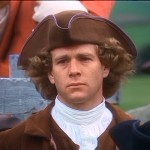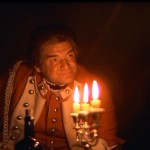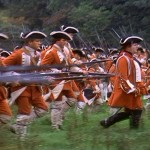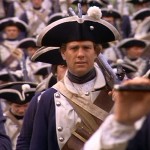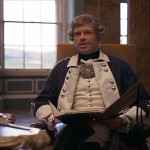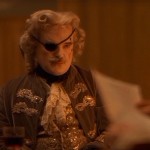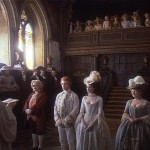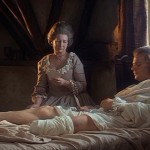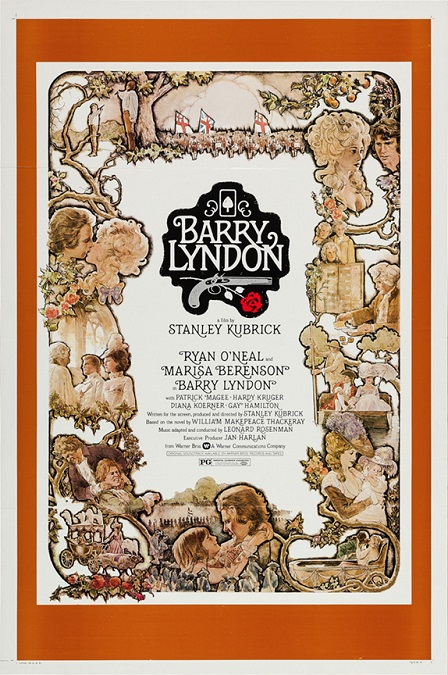
Barry Lyndon – 1975
Barry Lyndon was a film by Stanley Kubrick, and as such, it was slow, but never boring. It was a period piece that took place in the 1700s, and followed the life of a handsome Irishman named Redmond Barry, played by Ryan O’Neal. The story begins when he is a teenager and falls for his first love. She spurns him to marry a rich soldier. He challenges the man to a duel, kills him, runs off and joins the army. He deserts his post, gets conscripted into the Prussian army, and then recruited to become a spy after the war is over. He escapes Prussia with the man on whom he is spying, settles in England, becomes a successful gambler, marries a wealthy woman for her money, spends most of her fortune, is challenged to a duel by her high-born son, and gets shot in the leg which must then be amputated. He finally returns to Ireland with his mother.
That’s the entire plot, in a nutshell. Of course, it took Kubrick 3 full hours to tell the story. Fortunately, the film was visually interesting and engaging the entire time. The characters were well developed, the sets and costumes were flawless, and the cinematography was incredible. That’s the thing with Kubrick’s films. He is never afraid to really take his sweet time when telling his story, but he also never leaves you bored.
My first thought, when learning that Ryan O’Neal was playing the lead in a period drama was that his face was too modern. I also thought, when I found he was playing an Irishman, that his face was too American. Fortunately, I was wrong on both accounts. He did a very good job and didn’t seem out of place at all, except for one thing. His Irish accent was very inconsistent, coming and going throughout the film.
But that was easy enough to overlook. The trouble I had with his character is that he was not a very likeable man. But it’s alright. I don’t think he was supposed to be likeable, exactly. Redmond Barry was a self-centered opportunist who had no problem hurting other people if it got him what he desired. More than once, he betrayed those who loved him for personal gain.
He loved his mother, Belle, played by Marie Kean, and in Act II, his son Bryan, played by David Morley. His love for his first girlfriend, his cousin Nora, played by Gay Hardin, was the selfish and obsessive love of a youth. He loved his Commanding officer in the English army, Captain Grogan, played by Godfrey Quigley, and he loved his gambling partner, Chevalier du Balibari, played by Patrick Magee.
Everyone else, he seemed to step on as easily as breathing. This included his commanding officer in the Prussian army, who was always very kind to him, Captain Potzdorf, played by Hardy Kruger. He so badly mistreated his wife, Lady Lyndon, from whom he gained his new last name, played by Marisa Berenson. And he rarely showed any kindness to her son Lord Bullington, played by Leon Vitali.
The film was beautifully shot and was awarded 4 Academy Awards. It took home Oscars for Best Art Direction, which is set design, Best Cinematography, which is camera-work, Best Costume Design, and Best Musical Score. Kubrick went out of his way to make every detail look as realistic as possible. He used as much natural lighting as he could. He also found a way to successfully film by candle light since the story took place before the age of electricity. He used filming locations that were perfectly suited to the opulence and grandeur of the time period.
While the original novel on which the film was based had a much more playful feel, treating the character of Barry Lyndon as a fortune-hunting Irish rogue, Kubrick’s film treated it as more of a dramatic tragedy. And no character was more tragic than Lady Lyndon. The way Redmond wantonly ignored her and squandered her fortune was nearly enough to make me despise him. Fortunately, her son, who never believed that Barry loved his mother, rebelled. True, Lord Bullington wasn’t a likeable character either, but at least I thought he was justified in the way he got rid of his step-father, and he was even generous, giving him an annuity for the remainder of his life. He saved his mother, though perhaps at the cost of her happiness, except that she had never truly been happy with her husband.
The tragic and melancholy ending was indicative of the entire film. The whole thing had very little joy in it. The story was told with a perfunctory coldness that, at times, felt too sterile and passionless. But I think that was the style that Kubrick was trying to achieve. Even the constant narration that helped to propel the story from beginning to end, was told from an omniscient, third-person perspective, establishing a detachment from the events taking place. The tone of the narrator was the same whether Barry was being robbed or married, whether his son was dying or his leg was being amputated. Incidentally, it also had a hand in causing the film’s slow pace.
